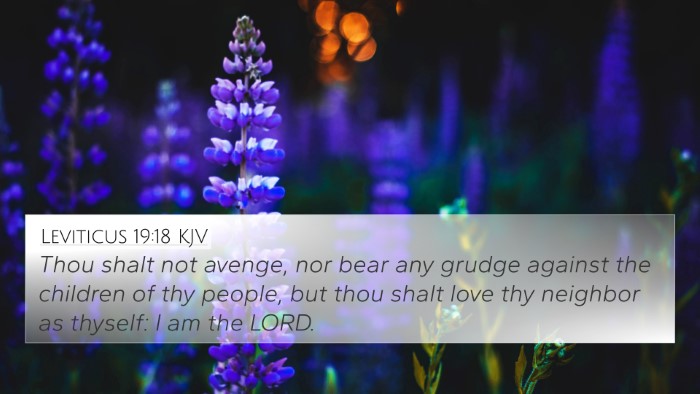Understanding Matthew 5:43
Verse: “You have heard that it was said, ‘You shall love your neighbor and hate your enemy.’”
Summary of Biblical Meaning
This verse is part of the Sermon on the Mount, where Jesus reinterprets the Mosaic law, highlighting the true nature of love, especially towards one’s enemies.
Commentary Insights
-
Matthew Henry:
Henry emphasizes that Jesus is contrasting the traditional interpretation of the law with His teachings. The phrase “love your neighbor” derives from Leviticus 19:18, yet the notion of hating one’s enemy was a misguided addition. Jesus challenges this notion, calling for comprehensive love that includes those who oppose us.
-
Albert Barnes:
Barnes asserts that the command to love one’s neighbor is clear, but the addition to hate one’s enemy lacks scriptural foundation. Jesus is expanding the moral law by urging His followers to engage in an unconditional love that goes beyond cultural precedents.
-
Adam Clarke:
Clarke explains that the sinful nature often leads to enmity among humanity, and this verse illustrates a common misunderstanding of God’s command. Instead, Jesus is advocating for love as a positive, proactive stance, transcending animosity.
Related Bible Verses
Understanding Matthew 5:43 can be enriched by exploring the following cross-references:
- Leviticus 19:18: "You shall not take vengeance or bear a grudge against the sons of your own people, but you shall love your neighbor as yourself." This Old Testament command sets the foundation for Jesus' teaching.
- Luke 6:27-28: "But I say to you who hear, Love your enemies, do good to those who hate you..." This parallel passage further emphasizes Jesus’ command to love enemies actively.
- Romans 12:20: "To the contrary, if your enemy is hungry, feed him; if he is thirsty, give him something to drink..." This verse illustrates the practical application of loving one’s enemies.
- John 13:34: "A new commandment I give to you, that you love one another: just as I have loved you, you also are to love one another." This underlines the seriousness of Jesus’ teaching on love.
- 1 John 4:20-21: "If anyone says, ‘I love God,’ and hates his brother, he is a liar; for he who does not love his brother whom he has seen cannot love God whom he has not seen." This reinforces the idea that love must extend beyond friends to even enemies.
- Matthew 5:44: "But I say to you, Love your enemies and pray for those who persecute you." This verse directly follows Matthew 5:43, clarifying Jesus' message of love.
- Ephesians 4:32: "Be kind to one another, tenderhearted, forgiving one another, as God in Christ forgave you." It connects the act of forgiving and loving with God's forgiveness.
- Proverbs 25:21: "If your enemy is hungry, give him bread to eat, and if he is thirsty, give him water to drink." This Old Testament wisdom also supports the theme of loving one’s enemy.
- Colossians 3:13: "Bearing with one another and, if one has a complaint against another, forgiving each other; as the Lord has forgiven you, so you also must forgive." This speaks of the broader principle of love and forgiveness within the Christian community.
Thematic Connections
This verse exemplifies profound inter-Biblical dialogue, highlighting themes such as:
- The Nature of Love: A call to adopt a divine perspective on love that transcends worldly notions.
- Forgiveness: A crucial element of genuine love that allows reconciliation and restoration.
- Ethical Behavior: The moral implications of our actions towards others in accordance with God’s commandments.
- Discipleship: Embracing Christ’s teachings requires radical love, setting a unique standard for His followers.
Tools for Bible Cross-Referencing
For deeper understanding and study, utilize various tools:
- Bible Concordance: A valuable resource for finding related verses and themes.
- Bible Cross-Reference Guide: Helps identify and connect thematic links across scriptures.
- Cross-Reference Bible Study: Engaging with different translations and commentaries can deepen insights.
- Bible Reference Resources: Websites and books designed to facilitate thorough studies of scripture.
- Bible Chain References: Systems that connect verses in a logical way to help trace biblical themes.
Further Study Suggestions
Understanding Matthew 5:43 and its implications can be enhanced by exploring:
- The Gospels: A comparative study of how different Gospel writers present Jesus' teachings on love.
- Old vs New Testament: Identifying connections between the law and Jesus’ teachings of love.
- Pauline Epistles: Insights into the early church’s understanding of love in practical terms.
- Prophetic Literature: Examining how prophets spoke of love and mercy in relation to enemies.
Conclusion
Matthew 5:43 invites believers into a transformative understanding of love that challenges cultural norms and personal inclinations. By exploring related verses and embracing comprehensive love, one can gain a fuller perspective of what it means to follow Christ's teachings in a world rife with conflict.
















